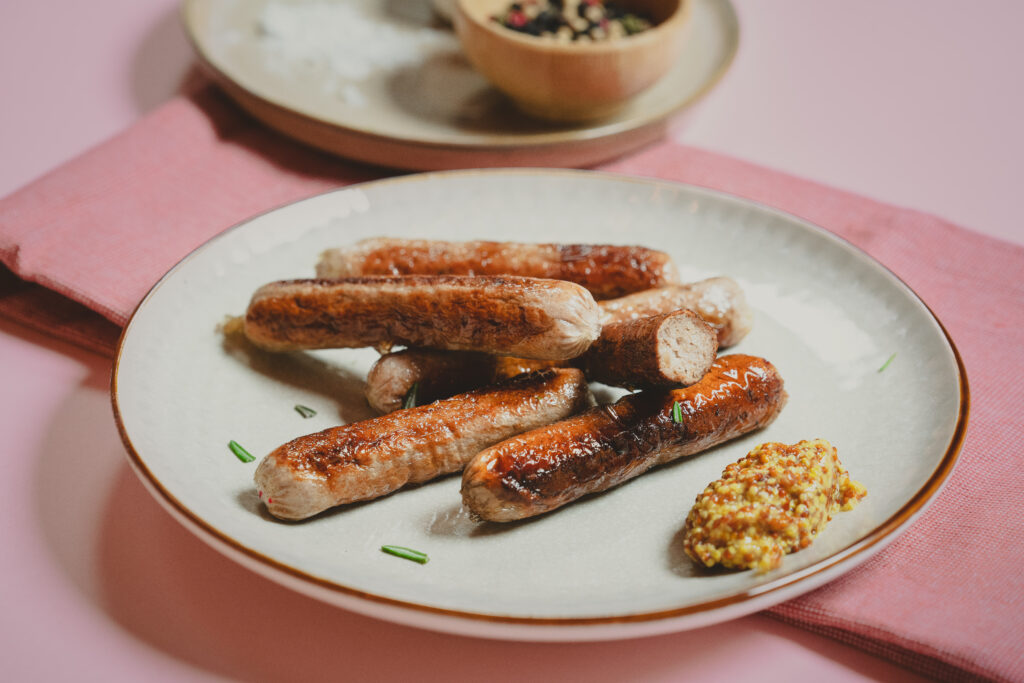Meatable Raises $35M For Cultivated Pork Production, Eyes 2024 Singapore Launch
4 Mins Read
Dutch startup Meatable has raised $35M in funding to scale the production and accelerate the commercial launch of its cultivated pork. Bringing the total funding received by the company to $95M, the announcement comes a month after it worked with Mosa Meat, HollandBIO and the Dutch government to create a ‘code of practice’ facilitating cultivated meat tastings in the country.
The Series B investment round was led by Agronomics, and so Invest-NL join as a new investor, contributing $17M. Meatable aims to use the funds to scale its processes and speed up the commercial launch of its cultivated pork. The scaling and optimisation of its manufacturing processes will also help it become cost-competitive with conventional meat.
“Our pursuit for appropriate protein alternatives that further a sustainable and circular society remains ceaseless,” said Bastiaan Gielink, senior investment manager at Invest-NL. “The breakthroughs achieved by Meatable have convinced us that they possess the know-how and team to make this potential a reality.”
Meatable eyes 2024 Singapore launch

In October 2022, Meatable partnered with Singapore’s ESCO Aster, the only regulator-approved contracted cultivated meat manufacturing facility in the world, in its bid towards achieving approval from the Singapore Food Agency. And in May, it hosted its first cultivated meat tasting event in the city-state, with the goal of launching its pork sausages and dumplings in select restaurants and retailers in 2024.
Meatable co-founder and CEO Krijn de Nood confirmed to Green Queen that the company will be looking to expand to the US after the Singapore launch, before exploring other markets, depending on the regulatory processes. The US became just the second country to approve the sale of cultivated meat products in June, granting regulatory clearance to Upside Foods and Good Meat.
“In order to gain regulatory approval in the US, we’re working with the relevant US experts and authorities on this matter – including the US Food and Drug Administration and the United States Department of Agriculture,” said de Noord. “Our application in Singapore gives us useful points of reference as well.”
Opti-ox technology helps avoid FBS

To produce its cultivated pork, Meatable uses a proprietary technology called Opti-ox, eschewing the need for fetal bovine serum (FBS).
“To create Meatable’s cultivated meat, our team first isolates a single animal cell, taken harmlessly from an animal. While immortalised cell lines are more commonly found in the industry, they require an alteration of the cells to allow them to multiply indefinitely,” explained de Nood.
The company’s patented tech instead uses pluripotent stem cells (PSCs), which “have the natural ability to keep on multiplying and to do so rapidly” – and these double in just 24 hours. “The difficulty with using PSCs is that it can be more challenging to change them from stem cells into more specialised cells, such as muscle or fat,” said de Nood. “However, by using these cells in combination with patented opti-o technology, we’re able to produce real muscle and fat cells that are fully differentiated in just [eight] days.” That’s about 30 times faster than it takes to rear a pig for pork on the farm.
“This is coupled with a perfusion process that allows the team to work in a continuous cycle to generate very high cell densities,” he added. “This means we can grow a lot of cells in our bioreactors, and harvest cultured meat from the reactors continuously. This is a great step forward as it increases productivity and makes the process easy to scale.
“Altogether, this means that when it comes to making real cultivated meat, we have the tools to make the process extremely efficient and one that can scale to serve customers around the world.”
Asked about consumer perception of cultured meat – people who are vegetarian or vegan may be uneasy about the idea of eating meat grown from an animal cell – de Nood stresses that cultivated meat isn’t “like meat” – it is meat.
“Cultivated meat addresses some of the concerns people might have about eating traditional meat. For example, there is no harm done to animals and it will in time be much more environmentally friendly to produce than industrially farmed options. In the end, cultivated meat will be a dietary choice, just like any other. We are aiming to make that choice as self-explanatory as possible.”
A 2021 poll conducted by Israeli cultured meat producer Aleph Farms – which applied for regulatory approval in Switzerland and the UK last month – showed that 87-89% of Gen Zers, 84-85% of millennials, 76-77% of Gen Xers, and 70-74% of Boomers were at least somewhat open to trying cultivated meat.
“These numbers are growing every day,” said de Nood. “We know that education is essential. The more people know about cultivated meat, the more they are open to it and willing to try.”




